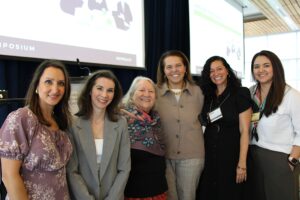
Celebrating Driving Equity Through Health Innovation
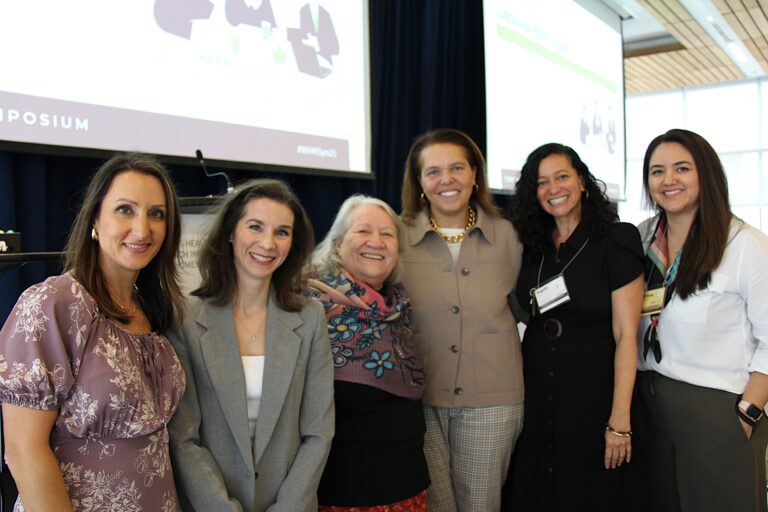
On Friday, March 7th, 2025, the women’s health research community came together to celebrate the Tenth Annual WHRI Symposium, coinciding with International Women’s Day and marking the start of Women’s Health Research Month . The event was well– attended with 267 attendees, including 193 in-person and 74 online.
The theme of the tenth annual symposium was dedicated to driving equity through health innovation. Presenters introduced attendees to innovative ways their research is addressing gender-based inequities in health, united by a common sentiment of hope that was carried throughout the day. Indigenous methodologies, strengths-based principles, and community-led practices were promoted.
To start the event, WHRI Executive Director, Dr. Lori Brotto, welcomed attendees.
Elder Sheila Nyman, a Syilx (Okanagan) Métis woman, shared she is from the Lower Similkameen in the Okanagan Valley of British Columbia. She then acknowledged the ancestral and traditional lands of the xʷməθkʷəy̓əm (Musqueam) on whose land the in-person event was held Peoples. Elder Nyman, a mentor, mother, grandmother, and matriarch in her family, highlighted the importance of connecting with ancestral energy and walking “in a good way.” She explained that “in a good way” involves connecting with the earth, cleansing oneself, and ensuring research directly benefits people and society. To conclude, she highlighted the importance of intent and integrity in approaching research, encouraging researchers to reflect on their motivation and the impact that their research has on people.
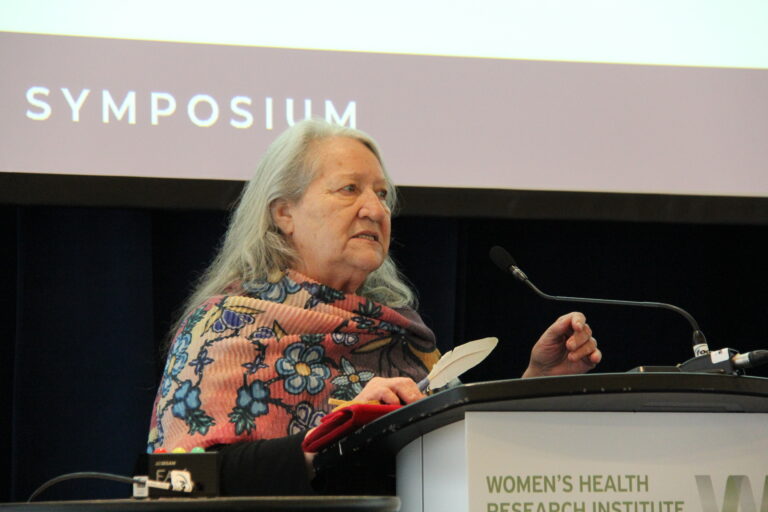
Maryna Korchagina, the Assistant Deputy Minister of Population and Public Health at the BC Ministry of Health, highlighted improvements in health security and the crucial role of research in shaping policies and services and applauded all the attendees for their unique and critical roles in supporting improvements in women’s health.
Dr. Deborah Money, WHRI inaugural Executive Director and Head and Professor in the Department of Obstetrics and Gynaecology at the University of British Columbia (UBC), reflected on the remarkable growth of the WHRI since it was first established back in 2005. Now, the WHRI is one of the leading institutions in women’s health research in Canada. Dr. Money congratulated Dr. Lori Brotto, Kathryn Dewar and Dr. Gina Ogilvie for their contributions and vision. Dr. Money applauded the excellence in research, training, and funding that WHRI has achieved, and expressed pride in the WHRI’s role in advancing women’s health through innovation. Lastly, Dr. Money shared a key reflection on continuing to do research “in a good way” for the benefit of people and society that echoed the main message of Elder Sheila Nyman’s opening remarks.
Indigenous Women's Wellness: ReSearching, ReClaiming and ReMatriating
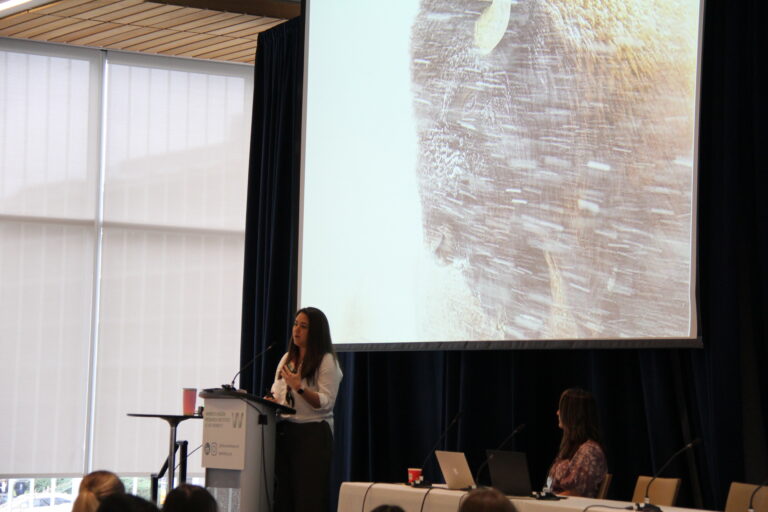
The symposium keynote was delivered by Dr. Brittany Bingham, a proud member of the shíshálh (Sechelt) nation, an Assistant Professor at UBC, and a Health Research BC Scholar. Dr. Bingham leads Indigenous community-driven health research, aiming to improve Indigenous healthcare experiences and inform system transformation and is the founder and lead of the Indigenous Equity Lab at the WHRI.
Dr. Bingham began her talk by sharing her positionality, discussing her roles within her community and family as a mother, sister, wife, and mentor. She emphasized the importance of the “Academic Auntie” role, a crucial mentor position in Indigenous communities that can be adapted in academia to support the next generation of Indigenous scholars.
Key takeaways from her presentation centered the importance of traditional roles in matriarchal societies:
- The buffalo have played a vital role in the survival, culture, and spirituality of many Indigenous communities. They have provided essential resources such as food, clothing, shelter, and tools, and have shaped numerous Indigenous traditions and ceremonies.
- The oldest female buffalo leads the herd through tough times and storms, symbolizing the vital role of elders and matriarchs in guiding and protecting their communities.
- A Matriarchy is about community roles, not necessarily gender. Matriarchs are loving, hold accountability, and uplift the next generation.
- Matriarchs support Indigenous survival, carrying language and traditions that could have been lost.
- Matriarchy restores lands and the sacred balance of Mother Earth.
- Matriarchy is heart work centered on culture, identity, and values.
The keynote presentation concluded with a powerful message from Dr. Bingham:
“As our people have been harmed by colonial violence, it is the grandmothers, and the women and the leaders of families and communities that sustain us and push us forward.”
Dr. Brittany Bingham
Rapid Research Takeaways
The morning continued with rapid fire presentations that illustrated how person-centered practices are conducive to hope and transformative innovations.
Amy Jamieson: “understanding the essential parameter of race, ethnicity, and geography in endometrial cancer care in British Columbia”
- Identified how disaggregated data is a necessary tool to achieve health equity, declaring: “if we don’t collect the data, we don’t know where the problems lie.” Far from problematizing, knowing “where the problems lie” is foundational to imagining strength-based solutions.
Kalysha Closson & Yas Botelho: “measuring gender equity and gender-based power dynamics within relationships of queer, trans and non-monogamous young women and non-binary youth”
- Described their lived experience centering practices, illustrating how their youth advisory committee (YAC) and youth research associates (YRA) have informed the development of a new measurement for gender equity in relationships.
- Identified how research does not represent the diversity of youth, relationship types, and identities in BC
- Demonstrated commitment to reciprocity by drawing attention to the Zine created with their YAC and YRA (heyzine.com).
Piper Scott-Fiddler, Danette Jubinville & Miranda Kelly: “the story project: improving access to family planning for Indigenous Peoples through storytelling”
- Anchored their presentation in how, as Miranda stated, “relationality at the core of everything that we do”
- Demonstrated, as Piper described, “how deep and special connecting to community is” in their work understanding Indigenous People’s experiences with abortion and contraception in BC, the sacred stories collaborative (Indigenous matriarch advisory circle)
- Emphasized how relationships take time, and how Indigenous Peoples seeking abortion and contraceptive care value time as care, sharing: “When we truly listen, we create space for healing, for strength, and for transformation.”
Altogether, the presentations highlighted how integral relationships are to responding to ongoing health inequities.
Emerging Women’s Health Issue: Silent Genomes: Addressing the challenges of equitable access to genetic/genomic diagnosis
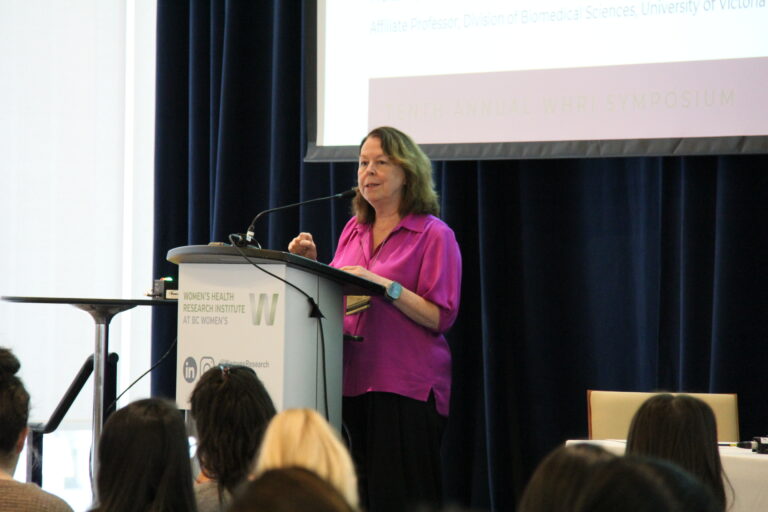
A Professor in UBC’s Island Medical Program, Dr. Laura Arbour, highlighted the national Silent Genomes Project, which aims to reduce healthcare disparities and improve diagnostic success for Indigenous children with rare genetic diseases. She discussed that a key issue in genetics and genome testing for rare diseases is the lack of equitable access for Indigenous populations.
Key takeaways from her presentation include:
- Equitable access requires reference data. Indigenous populations often lack representation in genome reference databases, impacting the interpretation of genetic sequencing results.
- The Indigenous Background Variant Library (IBVL) was developed by the Silent Genome Project, with DNA samples from Indigenous communities across Canada. The IBVL was guided by the Silent Genomes Indigenous Rare Disease Diagnosis (S-GIRDD) Steering Committee. This initiative prioritized clinical diagnostic support while respecting Indigenous governance, data sovereignty and secure data handling. The development of the IBVL integrated OCAP and community engagement principles, in acknowledgment of Historical mistrust due to unethical research practices, such as the nutrition studies in Residential Schools that led to concerns about stigmatization and exploitative use of data against Indigenous Peoples.
- Rare diseases do not only affect children, but also the women around them. As primary caregivers and advocates, women have revolutionized awareness and advocacy of rare diseases.
Dr. Laura Arbour shared a foundational principle of her research that reflects the theme of hope:
“Equality is leaving the door open for anyone who has the means to approach it. Equity is ensuring there is a pathway to that door for those who need it.”
Dr. Laura Arbour
Rapid Research Takeaways
The role of technology in bridging access to health equity was further explored during the second set of rapid-fire presentations.
Denise Quesnel : “leveraging virtual reality for cultivating coping, resilience and compassion in emerging adults facing chronic health challenges”
- Drew upon VR’s embodied opportunity to practice compassion-based techniques. She exemplified the value of designing based on collective knowledge, in this case “the universal language of compassion”, to respond to psychosocial and quality of life needs in strength-based ways.
Lyndia Wu : “use of advanced sensing and data analytics techniques to investigate brain injury mechanisms in female athletes”
- Referenced biases in biomechanics to emphasize distinctions between female and male athlete brain injuries.
- Considered how the measurement of the biology and biomechanics of sports impacts is transferable to other causes of traumatic brain injury among women, including intimate partner violence.
- Showcased that there is highly biased data in existing literature on concussions in women’s sports.
- Illustrated how sex and gender influenced concussion outcomes, tailored approaches can be developed to better improve prevention, diagnosis, recovery and ultimately improving the long-term brain outcomes for women athletes.
Patti Janssen : “from innovation to sustainability: commercialization and scaling of SmartParent”
- Identified a gap and “problem” in mobile health offerings by the BC Ministry of Health. SmartParent addresses this gap, received resources, and collaborated with the BC Ministry of Health that created SmartParent as a prenatal education resource to prevent complications and reduce cost.
- Showcased how presenting research innovations, such as SmartParent—a text-based evidence-based perinatal education program — can address gaps in health care services, particularly for health authorities providing maternal services.
- Demonstrated how framing research innovations and products can be a solution and encouraged us all to “ask questions and envision solutions”.
These rapid research takeaways underscore the pivotal role of technology in advancing health equity and addressing health challenges.
Celebrating Innovation
The Symposium concluded on a celebratory note, acknowledging the accomplishments of Members, expanding on the hopefulness generated throughout presentations.
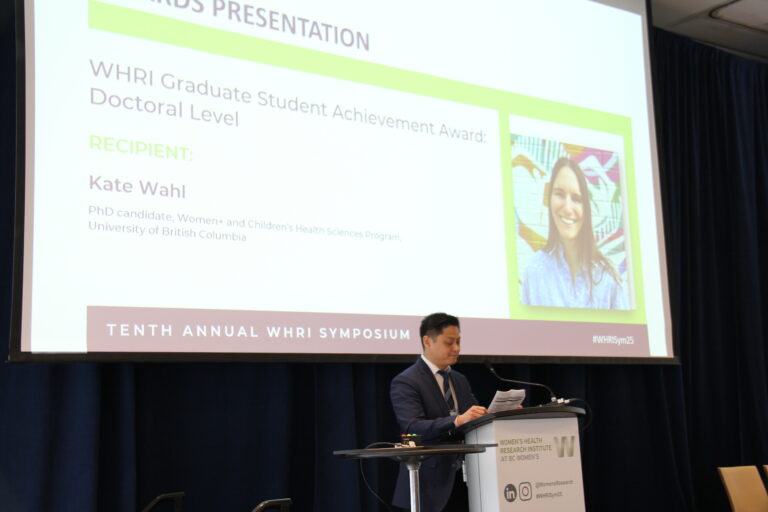
Dr. Paul Yong, WHRI Assistant Director, presented the WHRI Graduate Student Achievement Awards. Charity Mudhikwa received the Master’s level award, and Kate Wahl received the Doctoral level award.
The WHRI Graduate Student Achievement Award recognizes excellence in research relevant to women’s and newborn health. This award is part of WHRI’s 2019-2024 Strategic Framework for Trainees and Mentorship.
Charity Mudhikwa is a Master Science graduate from Simon Fraser University and successfully defended her Master’s in November of 2024, supervised by Dr. Angela Kaida. Her research focused on evaluating the validity and reliability of the everyday discrimination scale measuring racial discrimination among women in Canada.
Kate Wahl is a PhD student in Women and Children’s Health Sciences (WACH) Program in the Department of Obstetrics and Gynaecology at UBC and her research supervisor is Dr. Sarah Munro. Her research focuses on knowledge mobilization and how it can advance sexual and reproductive health of women.
Supporting Women’s Health Research Month
The event closed with remarks from Cally Wesson, Lori Brotto and Elder Sheila Nyman.

Cally Wesson, President and CEO of BC Women’s Health Foundation (BCWHF), spoke on the importance of philanthropy for women’s health research. She emphasized BCWHF’s role in fundraising for BC Women’s Hospital and the WHRI, which is central to BCWHF’s mandate. Wesson highlighted the growing profile of women’s health research and the significance of the BCWHF Illuminations Luncheon, an annual fundraiser that provides funding for catalyst grants, graduate and fellowship awards, and other initiatives supporting research at the WHRI. Cally Wesson emphasized the importance of philanthropy in advancing women’s health and achieving health equity.
Embracing Hope and Equity
Dr. Lori Brotto closed the event with gratitude, alongside Elder Sheila Nyman, both bringing the theme of hopefulness to the fore. Dr. Brotto encouraged attendees to harness their ideas, imagination, and motivations in our commitments to health equity.

“We know what we need, for our families, for our children [...] hope for a future for what we need”
Elder Sheila Nyman
Thank You
Thank you to our event sponsors, the Provincial Health Services Authority, the BC Women’s Health Foundation, and BC Women’s Hospital + Health Centre!
To all our presenters, attendees, trainees, poster presenters and event organizers, thank you. We hope that everyone has seen the importance of equity and health innovation in research.
We welcome you to our next year’s Women’s Health Research Symposium, which will occur on Friday March 6, 2026. Save-the-Date in your calendars and we hope to see you there.
For additional coverage on the Tenth Annual Women’s Research Symposium, view the highlight reel here.